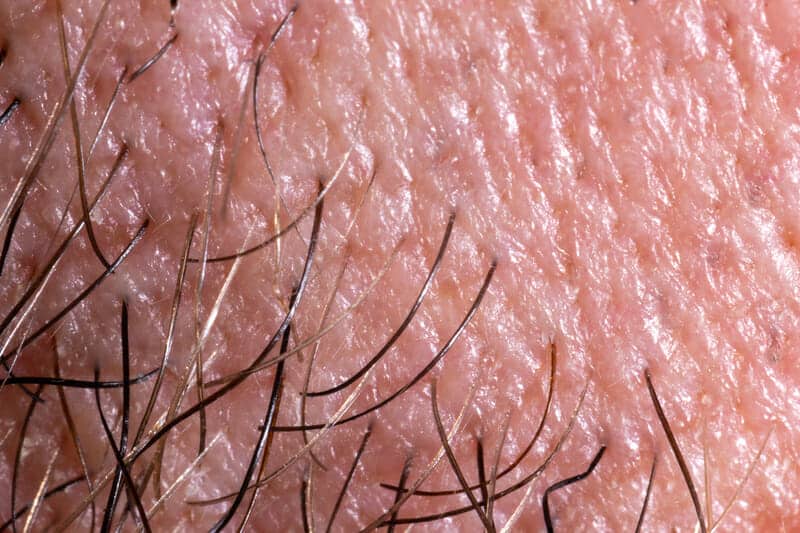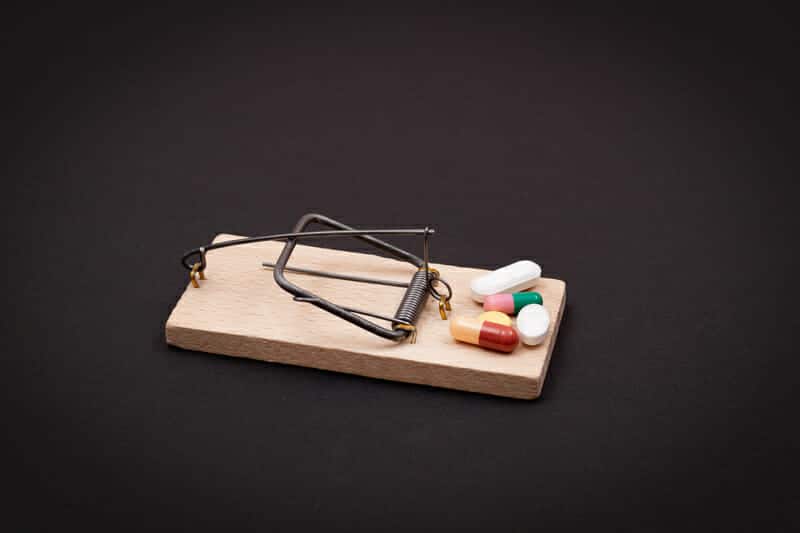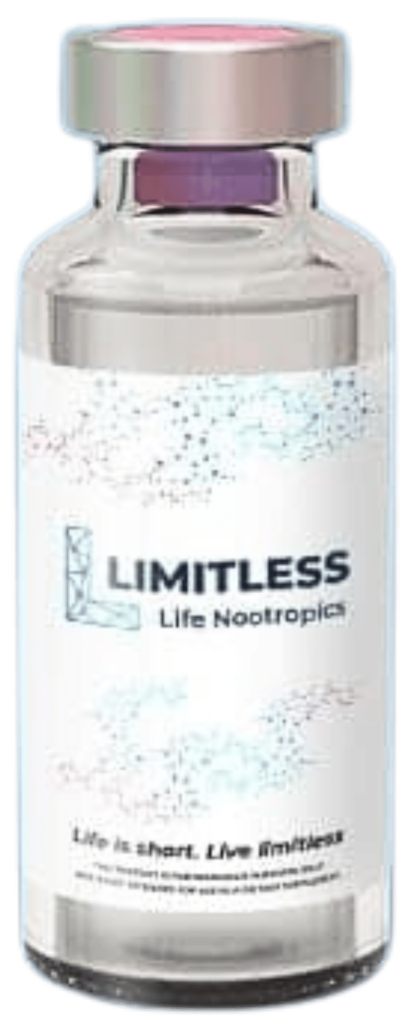When I wrote the ULTIMATE guide to stop hair loss forever, my main focus was on exposing drugs such as Finasteride and Dutasteride that inhibit dihydrotestosterone (DHT).
The intention was to get people off medications that were both ineffective and came with some unwanted side effects.
But what I didn’t realize was just how truly dangerous DHT inhibition can be — in fact, my penned article didn’t go deep enough into the rabbit hole.
And with just over 10 million prescriptions written for both medications every year, there is a serious crisis brewing within aging men who are being misled.
Therefore, this article will tell you how – and WHY – it is mission-critical to stop using Finasteride and Dutasteride immediately!
MAJOR shoutout to Dr. Rob Kominiarek for helping us pen this must-read article for millions of men and women around the world who suffer needlessly from the downstream consequences of DHT-inhibiting drugs such as Finasteride and Dutasteride.
If you want to listen to the main points of this article in audio form, check out the recent podcast I did with Dr. Kominiarek and Nick Andrews.
If you prefer a video format, watch the YouTube video below:
Table of Contents
ToggleA Deep Dive Into How DHT Works, And Its Connection To Hair Loss

Although I’ve covered the mechanism through which DHT inhibition “reverses” hair loss on Ben Greenfield’s website, I want to summarize the main points and go a level deeper.
DHT is the hormone, bluntly speaking, that makes men “men” from the moment they are conceived as a developing fetus in the womb (i.e. when the penile urethra is formed).
And right from the get-go, it is biologically essential for a man’s development:
“DHT is the most potent hormone among the androgens and is considered a pure androgen as it cannot convert into estrogen. It is formed primarily in peripheral tissues of the body, where it exerts its effects. Testosterone converts to DHT by the action of the 5 alpha-reductase enzyme at these target tissues.
It plays a vital role in the sexual development of males. During embryonic life, it is involved primarily in the sexual differentiation of organs. Through adolescence and adult life, DHT promotes prostate growth, sebaceous gland activity, male pattern baldness, and body, facial and pubic hair growth.”
And just to dive deeper into what happens following the conversion of testosterone into DHT via the 5αR (5-alpha-reductase) enzyme:
“DHT specifically recognizes androgen receptor NR3C4 (nuclear receptor subfamily 3, group C, member 4) and shows a higher potency compared to its analog.
In fact, dihydrotestosterone demonstrates: (1) an affinity to androgen receptor four times greater than that of testosterone, (2) a rate of dissociation from the NR3C4 three times slower than testosterone, (3) an amplification of the androgenic signal by its more efficient conversion to the DNA-binding state, (4) increasing the so called “transformation” process.
Once the [DHT] binds to its NR3C4, the confirmation change of the androgen receptor results in an alteration in net charge and allows the receptor-hormone complex to bind to DNA and regulate the gene expression.”
This means the conversion is necessary in order for testosterone to fully exert its positive and protective health effects throughout the body.
And anything you take that can inhibit DHT production is essentially stealing your manhood (more on that soon), for which there are VERY few medical reasons why you would even consider doing such a thing.
However… the same importance of DHT cannot be extended over to hair loss on your scalp.
As I have already explained in the past, DHT is NOT the foundational root cause of hair loss.
Yes, it can certainly contribute and play a role in the process, but there’s no logical reason to go after an essential male hormone when it is not the causative factor of hair loss.
Hair loss is fundamentally an issue of insufficient blood flow to your scalp and consequently to the hair follicles that require oxygen and nutrients for optimal growth.
Not to mention there are many other causes that easily explain why men lose their hair as they get older:
- Inflammation that ranges from “micro” (within the scalp) to systemic (whole-body)
- Metabolic dysregulation/dysfunction in diseases such as type 2 diabetes
- Genetic predisposition to hair loss
- Poor lifestyle choices (being fat, not exercises, eating too much sugar and fat, drinking excess alcohol and high-stress levels)
- Aging (i.e. loss of aponeurosis that holds the hair follicle in place)
So if all of the above is true, just how devastating can the consequences of DHT inhibition be?
The Deleterious, Lifelong Side Effects Of DHT-Inhibiting Drugs

Although millions of Americans are using Dutasteride and Finasteride, the real question is whether these people are getting full and informed consent:
Do any of these patients KNOW about the deleterious primary (and secondary) downstream effects of the long-term daily use of these DHT inhibitors, and if so are they properly informed about them in advance?
The answer is obviously no, as any doctor in their right mind who knows about the information below would be extremely hesitant to write a script for any aging man or woman worried about an ego-driven problem such as losing hair.
Post-Finasteride Syndrome (PFS)
This is a topic near and dear to my heart, as I have personally lost two friends to PFS who could not handle their symptoms and chose to end their own lives.
The late and great Dr. John Crisler was also one of the few physicians who spoke out aggressively — and very early — about the crisis of PFS among men in their 20s and 30s:
Here’s why something like PFS should give you great pause when looking at what the medical consequences are:
“Post-finasteride syndrome (PFS) is a constellation of serious adverse side effects manifested in clinical symptoms that develop and persist in patients during and/or after discontinuing finasteride treatment in men with pattern hair loss (androgenetic alopecia) or benign prostatic hyperplasia.
These serious adverse side effects include persistent or irreversible sexual, neurological, physical and mental side effects. To date, there are no evidence-based effective treatments for PFS.
…One key indisputable clinical evidence noted in all reported studies with finasteride and dutasteride was that use of these drugs is associated with development of sexual dysfunction, which may persist in a subset of men, irrespective of age, drug dose or duration of study.
Also, increased depression, anxiety and suicidal ideation in a subset of men treated with these drugs were commonly reported in a number of studies”
Since 2007, the Post-Finasteride Syndrome Foundation has been comprehensively cataloging and documenting every scientific study and media piece written on the subject.
It may not get coverage on your local news channel, but it’s a silent killer ruining the lives of men across the world before their lives have truly begun.
The Severe Mood Disturbances
So where does the occurrence of severe depression, suicidal ideation and sometimes uncontrollable anxiety come from when taking DHT-inhibiting drugs like Dutasteride and Finasteride?
As it turns out, a small amount of these drugs can pass the blood-brain barrier (BBB) when ingested and thus exert some unwanted damage to one’s mental health.
What happens as a result is many of the neurochemicals responsible for regulating your mood are compromised in their production:
“Neurosteroids play a pivotal role in modulating neural activity through interaction with neurotransmitter receptors and neurotransmitter-gaited ion-channels. These neurosteroids interact with a host of neurotransmitter receptors and modulate seizure susceptibility, anxiety, stress, and depression.
5α-R reaction is the rate limiting step in the conversion of testosterone, progesterone, cortisol, corticosterone, and DOC into their respective 5α-dihydro-deratitves, which serve as precursors for 3α-hydroxysteroid dehydrogenase which transfroms such precursors into their respective neurosteroids (androstanediol, allopregnanolone [AP], tetrahydrocortisol, tetrahdyrocorticosterone, and tetrahydrodeoxycorticosterone.”
(Source)
The picture above shows the inevitable chain of events: Finasteride/Dutasteride blocks the production of neurosteroids essential for proper mood regulation and brain protection, sometimes to the point where the damage is long-lasting and unfixable.
But this isn’t a mere hypothesis.
A 2014 pilot study examining 131 young healthy men who reported side effects 3 months after stopping the use of finasteride for hair loss documented the following cognitive symptoms:
- Severe memory/recall impairment – 56% of subjects
- Slowed thought processes – 74% of subjects
- Impaired problem solving – 69% of subjects
- Mental cloudiness / brain fog – 75% of subjects
- Confusion – 55% of subjects
- Attentional difficulties – 74% of subjects
- Repeating questions during a conversation – 52% of subjects
Of course, sometimes this type of unwanted side effect won’t be enough to deter people away from these drugs… so let’s put it another way!
The Long-Term (And Sometimes Permanent) Damage To Men’s Sexual Health
Dr. Rob Kominiarek has personal experience in dealing with patients who suffer severe sexual dysfunction following the use of Finasteride/Dutasteride.
I’ll get to the scientific evidence in a minute, but just take the time to hear what he has seen over the past 10 years:
“The vast majority of men I see for this kind of problem are YOUNG – many men in their 20s and 30s, sometimes even the older teens. It breaks my heart to see a 20-something man in his sexual prime who cannot get an erection because of the use of DHT-inhibiting drugs. Erection quality, ejaculatory function, libido… it’s almost all gone
I then have to use every trick in my medical bag of tools to get erectile function back to normal but often times it’s just not possible.
These men will spend their entire 20s attempting to fix their erectile dysfunction and at the age of 30 have to get a penile implant. I would say that every year, I send out 12-16 individuals under the age of 40 to get one of these implants.
And even in older men who start using DHT-inhibiting drugs in the 5th to 7th decade of their life have the same problems: They lose erection quality and blame it on old age, not knowing it could easily be something else they’re doing.”
So what’s the evidence supporting Dr. Rob’s claims?
First, we have the reduced fertility in men who use DHT-inhibiting drugs:
“Finasteride, even at low doses, may cause reduced sperm counts in some men. In this population, counts improved dramatically for the majority of men after finasteride discontinuation. The hormone parameters, sperm motility, and sperm morphology were unchanged after cessation. Finasteride should be discontinued in subfertile men with oligospermia, and used with caution in men who desire fertility.”
We also have the overall sexual dysfunction in long-term Finasteride/Dutasteride users, EVEN after they discontinue either drug:
“We conducted standardized interviews with 71 otherwise healthy men aged 21–46 years who reported the new onset of sexual side effects associated with the temporal use of finasteride, in which the symptoms persisted for at least 3 months despite the discontinuation of finasteride.
94% developed low libido, 92% developed erectile dysfunction, 92% developed decreased arousal, and 69% developed problems with orgasm. The mean number of sexual episodes per month dropped and the total sexual dysfunction score increased for before and after finasteride use according to the Arizona Sexual Experience Scale”
“The mean duration of finasteride use was 28 months and the mean duration of persistent sexual side effects was 40 months from the time of finasteride cessation to the interview date”
And if you want to take a deeper dive into the overwhelming evidence demonstrating the connection between DHT blockers and worse sexual health in men, this 2017 review of MULTIPLE clinical trials should be all the evidence you need.
Like Messing With Estrogen, You Just Don’t Alter Your Body’s DHT Levels
I have written prolifically about the dangers of inhibiting your estrogen levels through drugs such as aromatase inhibitors (AIs).
The decision to do so by physicians is ill-advised and not based on sound science, as there are serious long-term (and often short-term) deleterious effects involving bone and mineral metabolism, cognitive health, and heart function.
(The latter is well-documented in competitive bodybuilders who die prematurely of cardiovascular problems)
In the same way testosterone has to be aromatized into estrogen in order for its biological effects to be conferred, the same story holds true for the conversion of testosterone into DHT: It all comes back to hormonal BALANCE!
Nick Andrews says it best when it comes to optimizing hormonal health:
“Your body is always working to maintain a state of homeostasis (i.e. bodily equilibrium). When you introduce an exogenous push on your system, now your body is always pushing back on that.
Think of it like a car engine: If you drive with one foot on the accelerator and the other foot applying slight yet consistent pressure on the brake slightly, for the first 5 miles you’re fine. After 500 miles, you’ve destroyed your brakes. The wear and tear is persistent and continues to build-up the longer you choose to drive this way”
But unlike the use of AIs, whose effects can sometimes be reversed with discontinuation, the odds are far worse for DHT inhibitors.
The “Gamble” Men Take With Using Finasteride And Dutasteride
Dr. Rob Kominiarek has used tens of thousands of medications in his lifetime, yet DHT inhibitors are the ones that prolifically scare him when the possibility of using them comes up.
And the reason for that is the game of “medical Russian Roulette” you play when you administer them:
- Situation #1: One dose is enough to cause permanent problems (Dr. Kominiarek has seen this first hand)
- Situation #2: Men use Dutasteride/Finasteride, experience unwanted side effects, but then return to normal once they stop using the drug
- Situation #3: Men can use Dutasteride/Finasteride daily for several years on end without suffering through any side effects whatsoever.
This is NOT the kind of gamble you should want to take… there can be unwanted long-term side effects that rise up very quickly and take a very long time to subside (if at all).
And what’s the reason for the sharp contrast in how people respond to the DHT-inhibiting drugs?
Dr. Kominiarek doesn’t have a definitive answer but the primary culprit appears to be individual genetics:
“There are some men who can receive supraphysiological doses of testosterone without a single side effect — everything good happens and nothing bad happens.
The same happens to some men who use DHT inhibitors — hair grows back, no changes to mood, no differences in sexual performance and erectile quality, and so on.
But then you have a 20-year-old who takes 2 pills of Dutasteride/Finasteride, it’s been a year since he used the drugs, but he hasn’t felt right ever since.
He hasn’t gotten a single erection, his brain health is damaged, and the subject of suicidal thoughts has come up in private discussions.”
Just to show you how scary and life-threatening Situation #1 can be for a young man, Dr. Kominiarek has agreed to share an example of the type of situation he commonly sees in his practice
“Patient in mid-20s took 6mg of Finasteride over the course of 30 days. Expressed concerns over hair loss due to hair thinning/balding running in the family despite not showing any signs of hair loss.
Felt penile discomfort after first dose and went to the emergency room, did not make the connection between onset of penile symptoms and use of Finasteride.
Continued using Finasteride and started experiencing mental health problems by the 5th dose: Panic attacks, rapid mood swings, emotional instability.
End of month saw erectile function completely eliminated. Association between Finasteride use and erectile dysfunction was not made in time to reverse the outcome.”
(NOTE: Identifying details have been omitted to protect the privacy of the patients being discussed)
Can you imagine this?
A young healthy man who is so wrapped up in ego and vanity that he wanted a full head of hair… only to lose the ability to have sex, while facing the real possibility of needing a penile implant for the rest of his life.
The only question is why these outcomes aren’t making bigger waves in the healthcare industry.
Why Do Hair Loss Drugs Continue To Stay On The Market?

If the mental health and sexual performance of so many men in their prime are being destroyed by Finasteride and Dutasteride, then surely these drugs would have been swiftly eliminated from public consumption.
Nope!
Nick Andrews, who has over 2 decades of consulting and working in the deepest and highest levels of the pharmaceutical industry, explains why such thinking is naive and uninformed:
“The average person believes a drug is on the market because it helps people and it is safe. Wrong answer.
A drug is on the market due to a combination of factors: Financial viability in the eyes of Wall Street and market/consumer demand, positioning the drug from a regulatory standpoint to address a unique problem, tieing up a drug with intellectual property so it’s economically viable.
Given that the average drug costs $1.3 billion to bring to market and the entire process takes 10-12 years, you’re only asking yourself one question: If we’re spending $1 billion to get a drug to market, can we make a minimum of $1 billion off of it (preferably more)?
When the answer is “no”, you don’t do anything with the drug — it gets locked away in a file cabinet and that’s all you’ll ever hear of it.”
“However, pharma companies don’t care about side effects in the way the average person would think.
What they care about is a statistical analysis of the drug that shows a significant degree of the intended effect without life-threatening adverse events.
And once you have that, you play word games with definitions to make the data say what you want it to say”
“With the way the system is set up, nobody will EVER figure this out unless they are driven to educate themselves and not mindlessly believe whatever information is spoon-fed to them by alphabet-letter health agencies.”
Dr. Rob Kominiarek presents a different side of the issue, explaining what the average physician goes through when encountering the issues brought about by Finasteride/Dutasteride:
“The way the medical system is set up, there are metrics for doctors to hit (especially if they are employed by a hospital).
For example, in order for them to meet their patient quota they have to see a certain number of patients per day.
If you’re seeing each one for just 15 minutes, that’s hardly enough time to practice medicine at all. At that point you’re just a data monkey pressing keys for an insurance company.
When will you have time to intensively learn about the ins and outs of a given medication, along with its short/long term benefits and risks to the human body?
Someone goes to the family doctor and says they’re having a hard time getting erect will be given Cialis and sent home.
No penile ultrasound, no deeper understanding of what’s driving the poor erection quality (arterial problems, vascular problems, combination of the two, etc).
Nobody does those studies anymore.
Same deal with your hair falling out.
No questions about your body fat percentage, how much you exercise, what you eat, what pre-existing conditions you have… just a script written for Propecia with no further questions asked.”
Not surprising when you consider that poor health is now the new “normal” for everyday Americans(The Sick Care Rules).
Going back to Dutasteride/Finasteride… if we have an abundance of evidence about the negative impacts on sexual health, how did the pharmaceutical companies get away with this for so long?
Even though millions of men would avoid taking it if they knew this information, why aren’t these drugs off the market yet?
Bluntly, this crucial information was hidden and manipulated by the companies who (unsurprisingly) created these drugs.
In the case of Finasteride, Reuters wrote a scathing investigative piece in 2019 on how Merck – the manufacturer of the drug – categorically denied any ties between their product and sexual dysfunction.
Anybody who wants to bury their head into the sand and continue to naively believe in the “good-hearted” nature of the pharmaceutical industry should read every single word of that article.
Especially when damning truths like the following come out:
“In the more than 1,100 Propecia lawsuits that were consolidated in his court, Judge Brian Cogan has, without explanation, allowed Merck and plaintiffs’ lawyers to file evidence under the cloak of secrecy that has become pervasive in product-liability lawsuits.”
“…legal briefs filed by plaintiffs’ lawyers allege that in revisions to the drug’s original 1997 label, Merck understated the number of men who experienced sexual symptoms in clinical trials, and how long those symptoms lasted.
Other documents show that Merck knew roughly 20 years ago that sales of the drug would suffer if the public became aware of Propecia’s *possible long- term effects* on men’s sexual health.”
“The FDA declined to answer questions about what Merck shared with the agency or how it evaluated specific information the company submitted about its Propecia clinical trials.
It said it ‘takes very seriously its role in continuing to monitor and regulate the safety of drugs both before and once they are on the market'”
And even when you discount the intentional suppression of vital information for both physicians and patients, a closer look at the medical literature brings you to the same conclusion:
“Our recent meta-analysis of reports of clinical trials of finasteride for androgenic alopecia found that adverse event reporting was of poor quality, systematically biased, not generalizable to routine practice, and that most subjects had ≤1 year of finasteride exposure (Belknap et al., 2015).
Fifteen systematic reviews or meta-analyses of 5α-RI clinical trial reports each concluded that 5α-RI-associated sexual adverse events are infrequent, mild, and reversible.
None of these prior meta-analyses assessed the adequacy of evaluation of adverse events in primary clinical trial reports”
As you can imagine, the outlook for young men using these drugs is quite damning:
“Of 103 young men with new ED [erectile dysfunction], 34 (33%) had new PED [persistent erectile dysfunction]. Young men with >205 days of finasteride exposure had 4.9-fold higher risk of PED than men with shorter exposure.
Risk of PED was higher in men with longer exposure to 5α-RIs. Among young men, longer exposure to finasteride posed a greater risk of PED than all other assessed risk factors.”
I don’t expect the pharmaceutical companies to truly be held accountable or the victims (using DHT Inhibitors) to receive justice for Big Pharma’s crimes anytime soon.
So until that utopian world exists in the near future, let’s shift our focus towards treating the victims of DHT-inhibiting drugs.
How One of The World’s Top Health Optimization Doctors Gets People OFF Drugs Like Finasteride And Dutasteride

When I spoke to Dr. Rob Kominiarek about the topic of this article, my one question for him was very targeted:
What’s the easiest way to withdraw a man from these DHT-inhibiting drugs in a way that will maximally prevent side effect prolongation and minimize hair follicle death?
It’s a blockbuster question that will help millions of men worldwide if we can get a definitive answer.
Unfortunately, according to Dr. Kominiarek, the problem is so complicated in its physiology and its progression that a simple solution doesn’t exist:
“The solution is very individualistic and it entirely depends on the symptoms a patient has (or lack thereof), their unique biochemistry and genetics, and how they respond (or not) to the treatments I give them.
It’s a very difficult situation that requires me to play it out day by day”
“What I can present are some of the “tools” available at my disposal and the general order through which I attempt each one.
But there is no cookie-cutter solution with a proven protocol as of right now, and a lot of hormone optimization clinics are making a very big mistake by trying to do this with all of their patients “
“Depending on the issue, age and biochemical uniqueness of the individual, treatment will vary.
I need to work with someone who can open up the financial wheelhouse because it’s not inexpensive to get things corrected and it’s not guaranteed.”
So without further ado, here is how Dr. Kominiarek typically approaches the problems of sexual dysfunction and mental instability brought about by drugs such as Finasteride and Dutasteride…
NOTE: What you’re about to see is the “how” of Dr. Kominiarek’s general approach.
If you want a deeper understanding of WHY he’s implementing these steps, please read Dr. John Crisler’s thorough scientific breakdown of how he would approach treatment and recovery from post-finasteride syndrome
Step #1: Address The Patient’s Current Condition
For some inexplicable reason, there are patients who are on DHT-inhibiting drugs for 20+ years with no noticeable side effects.
(NOTE: But this is also debatable from a standpoint of ‘measurable side effects’. What are DHT Inhibiting Drugs doing to DNA (telomeres) is a much bigger and concerning question and truly not yet understood. This would likely be measurable with genetic screening tests as mentioned below.)
Those individuals, who fall under the “Situation #1” category mentioned earlier, are advised by Dr. Kominiarek to just stay on them and not even come off them to avoid unnecessarily creating a problem.
Sometimes they have high levels of DHT and don’t use therapeutic testosterone yet never experience deleterious side effects.
Then you have the people in Situation #2 who notice lower erectile quality immediately upon using Dutasteride/Finasteride, but after 1-2 weeks of not using the drugs, erectile quality returns to normal.
They are the lucky individuals and it’s a good thing you never hear back from them.
But then you have the people who Dr. Kominiarek hears from all the time — the “Situation #3” people — who NEVER get their erectile quality back, even when several months/years have passed since they last used the drugs.
These are the nightmare situations where people suffer from erectile dysfunction, depression/anxiety, or a mix of the two… and it happens to people who otherwise never had these problems(These are PFS sufferers).
All of this, again, most likely comes down to an individual’s genetic predisposition where they have major problems or no problems with 5-alpha-reductase inhibitors.
(Because as with any particular medication, there’s always the small subset of people who have problems)
In fact, there is brand new evidence suggesting there is a strong correlation between gene expression and likelihood of contracting PFS, something Dr. Crisler and Dr. Kominiarek have suspected for ages:
“Gene expression of cells from penile skin samples from twenty-six men of median age 38 years (IQR, 33-42) in the study group was compared with that from twenty-six men of median age 41 years (IQR, 35-62) in the control group (P = .13), with 1,446 genes significantly over-expressed and 2,318 genes significantly under-expressed in study patients. Androgen receptor expression was significantly higher in study patients compared to controls.”
… we present evidence of gene expression correlating with observed biologic differences in patients with post-finasteride syndrome; providers who prescribe 5ARs should be aware and advise their patients accordingly”
We don’t have a precise answer but we know something is happening at the level of the androgen receptor.
Hopefully, scientific progress will get us to the point where we can conduct genetic screening tests and know if someone is a candidate for Finasteride/Dutasteride on the basis of genetic susceptibility (i.e. their risk for developing erectile dysfunction).
While early and aggressive treatment is ideal, what works for one person will not always work for another.
Some patients can get treated with something as simple as over saturating DHT levels in their body, while for others it won’t matter.
Some people present symptoms of Finasteride/Dutasteride use within the first few doses, others take 2-3 months, and a few even take 1-5+ years down the line.
But either way, Dr. Kominiarek follows one precautionary principle when starting off:
“If it’s not broke, don’t fix it.
The last thing I want to do is alter the patients’ neurochemistry and body chemistry, thereby precipitate erectile dysfunction.
The best outcome is that people are never on these drugs in the first place.
If someone is not exposed to DHT inhibitors and AIs, I teach them the correct way to handle things”
Step #2: SLOWLY Stop The Use Of Finasteride/Dutasteride Over 1-2 Months
One of the major features of Dr. Kominiarek’s protocol involves the gradual weaning off of Finasteride/Dutasteride, rather than suddenly halting the medication altogether.
For example:
“If you’re on 1mg Finasteride a day (7mg/week), reduce to 6mg/week the next week, then 5mg/week the following week.
From there you can cut the daily dose in half each week. And then you can take the drug 6 days a week, 5 days a week, and so on.
At any point you can always stop at the level you’re at and take an extra week or two if symptoms start to appear.
Although a rare few can quit cold turkey without any issues, stopping the meds too quickly can precipitate a problem.”
Effectively you have a situation where a patient’s starting condition and their response to weaning off DHT inhibitors determines what the next step of treatment will be:
“If I can get a patient fresh to practice and have their hormone function to recover naturally without the use of AIs or DHT inhibitors, I ride that wave.
Nothing is broken and everything is functional, so the question is what you will remove and why you will remove it.
At the same time, if someone’s erectile quality is good while on a DHT inhibitor, I’ll let them stay on it to avoid creating a problem.
I’ve had situations in the past where I took people off finasteride and the diminished erectile function was accelerated.
In those situations, I am negatively impacting the androgen receptors.
This is not PFS, but rather a medication dependency problem the individual has brought upon themselves.”
If the sexual dysfunction and mood instability isn’t fixed after being clean from the DHT inhibitors, hormonal therapy is usually what follows.
Step #3: Elevate DHT Levels As High As Possible
The goal in this step is to oversaturate the androgen receptors with DHT (i.e. the active form of testosterone) as quickly as possible to restore erectile function and reverse the side effects.
For reference: A normal 20-something-year-old will have DHT levels of 60-80 ng/dL (sometimes 100), while a patient with compromised DHT production may have gone from 30-40 ng/dL as a baseline down to 5 ng/dL due to the use of DHT-inhibiting drugs.
But please remember that testosterone and hair loss are NOT correlated — Dr. Kominiarek has seen plenty of cases where a patient has DHT levels of 70-100 ng/dL without presenting any signs of hair loss whatsoever.
Likewise, someone can have DHT levels of 10 ng/dL alongside low testosterone and systemic inflammation, and their hair will be falling out in chunks.
The medications used for this step vary, but they can include:
- A rapidly dissolving tablet taken orally
- An injectable solution
- A transdermal testosterone cream applied to the scrotum for elevated DHT production
Either way, increasing DHT levels as high as possible and as soon as possible (via one or multiple therapies) is what Dr. Kominiarek aims for.
Other issues related to one’s hormonal system (thyroid dysfunction, levels of prolactin, oxytocin levels, and estrogen levels) will also be addressed if they are connected to sexual dysfunction.
Step #4: Restore Normal Production Of Critical Brain Neurochemicals
Regarding mood instability, severe depression and onset panic attacks, certain medications can help alleviate the symptoms.
One of the neurosteroids Dr. Kominiarek uses is pregnenolone, which converts to other neurosteroids such as allopregnanolone and comes with multiple benefits like mood regulation and memory function.
If needed, sometimes there is the loss of the serotonin that can be restored through the selective use of a selective serotonin re-uptake inhibitor (SSRI).
Yet things get much more difficult if the sexual dysfunction is still unfixed at this stage.
Step #5: Fix Erectile Function Via Tip-Of-The-Spear Therapies
The complete mechanism behind erection quality is extremely complex in nature — you have vascular, neurological, physiological, molecular, and psychogenic factors all working simultaneously to make a man go from flaccid to fully erect in a matter of seconds.
Not to mention that several neurotransmitters are also at play: Dopamine, serotonin, norepinephrine, nitric oxide, and many more.
In this step, Dr. Kominiarek has multiple treatments he can use:
- PDE5 inhibitors such as Cialis and Viagra to generate endothelial nitric oxide
- Penile injections such as Trimex and Quadmix to generate an erection
- Peptides such as Melanotan 2 and PT-141 to increase libido and stimulate spontaneous erections
- Continuing hormonal therapy with DHT and regularly looking at blood lab work
Should he get to the point where nothing he has tried ends up fixing the poor or non-existent erection quality, he has one last option…
Step #6: Penile Implants
By this stage, the patient has gone 3-5 years of their life without having had a single erection (let alone a useable one).
A penile implant sounds exactly like you think it does:
You surgically open up the penis and insert an implant in the penile tissue, along with a pump placed inside your scrotum.
You pump it up like an internal balloon and you have sex with your now-erect penis.
On a scale of 0-10 for hardness (10 being the hardest you can get), the implant will get you to 7-9 with a full pump.
And if the hardware “malfunctions”, you will have to get the implant replaced.
As you can imagine, this is the LEAST favorable option for any man.
It is by far the #1 reason why Dr. Kominiarek is so adamant about informing patients of the risk behind using DHT inhibitors.
He gets 6-9 patients a month who have PFS and did not have ANY problems with their sexual health prior to starting Finasteride (a.k.a. Propecia).
Dr. Kominiarek also gets 6 patients a year who he has to send out for penile implants after exhausting every other therapeutic option available to them.
If you STILL want to take a DHT inhibitor at this point in time, even after the warnings I have given you about impotence and mood instability… there’s no saving you.
The ONE Situation Where DHT-Inhibiting Drugs Are Objectively Useful

The very specific instance where DHT inhibitors are medically useful is ironically what they were originally prescribed for – the treatment of benign prostatic hyperplasia (BPH):
“BPH is an enlarged prostate.
The prostate goes through two main growth cycles during a man’s life.
The first occurs early in puberty, when the prostate doubles in size.
The second phase of growth starts around age 25 and goes on for most of the rest of a man’s life. BPH most often occurs during this second growth phase.
As the prostate enlarges, it presses against the urethra.
The bladder wall becomes thicker.
One day, the bladder may weaken and lose the ability to empty fully, leaving some urine in the bladder.
Narrowing of the urethra and urinary retention – being unable to empty the bladder fully – cause many of the problems of BPH.
“About half of all men between ages 51 and 60 have BPH.
Up to 90% of men over age 80 have it.”
So if someone has difficulty with urinating, doesn’t get the flow they want, or can’t even urinate at all, this is where Finasteride and Dutasteride can be helpful:
” Patients with symptomatic BPH who receive dutasteride or finasteride, either as monotherapy or combination therapy with α-blockers, can expect to experience significant prostate gland size reduction, improved symptoms, and reduced risk of progression in terms of long-term adverse outcomes.”
Especially when either drug is combined with a life-saving medications such as Tamsuolosin (here and here), both drugs show real promise.
However, you’ll usually only see these medications in men who are in their 60s-80s suffering from severe prostate problems.
Even then, they are only used in the interim until a patient has access to more advanced and new procedures being done by interventional radiologists to shrink prostatic tissue to create appropriate urine flow, thereby alleviating BPH permanently.
Not to mention there’s also been some “funny business” with mucking up the numbers showing a supposed lower incidence of prostate cancer with the two DHT inhibitors:
“Although the 5-alpha reductase inhibitors were shown to prevent low-risk cancers better than placebo, two large clinical trials painted a disturbing link between both drugs and an increased incidence of higher-risk prostate cancers.
Taken together, data from the trials — the PCPT and the Reduction by Dutasteride of Prostate Cancer Events (REDUCE) trial — showed the 5-alpha reductase inhibitors both provided a statistically significant reduction in the cumulative incidence of prostate cancer after four years (REDUCE) and seven years (PCPT) of treatment with dutasteride and finasteride, respectively.
But both trials also found an unexpected increase in the incidence of high-grade prostate cancers among men receiving the 5-alpha reductase inhibitors.”
Yet another reason to discard these drugs for life and never look back!
The Unexplored Connection Between Hair Loss, Spirituality, And The Male Ego

Before I conclude this article with an action plan for eliminating DHT-inhibiting drugs for good, I want to let Dr. Kominiarek take over and talk about the connection between hair loss, your sex life, and your ego.
“The identity of a man lives in his pelvis.
Not being able to do what a man is biologically designed to do, which is to penetrate a woman, damages their mental state and leaves them in a bad state of depression.
This is why the DHT inhibitors literally “steal” men when they exert their side effects.
Yet so many men are under the naive impression that their hair is what makes them men and thus allows them to be more attractive to women.
Not only is this empirically false, but the use of a DHT inhibitor to prevent hair loss is a purely lower-mind, ego-driven choice.
We’re at the point in society where millions of men and women will WILLINGLY give up their eyesight, their employment, their sexual performance, a social life, or their entire lifespan over the possibility of losing their hair!! (Source)
Having worked with so many men and listened to their problems, I’ve come to realize they are in a state of spiritual crisis.
We all suffer some form of trauma in our lives, but in today’s world there’s never been a higher level of unresolved issues and it manifests in the form of health problems.
As long as there isn’t some overwhelming medical problem with men, the problem is almost always a poor spiritual connection to the pelvis and thus a true connection with their inner identity (higher SELF).
This comes in the form of abuse, betrayal, guilt, the shame of things they did or had done to them.
There are exercises one can do to clear out pelvic ingestion and strengthen pelvic musculature, all of which contribute to the emission and secretion of fluids, along with erectile quality and ejaculatory force.
Once the ingestion is cleared, a man can fully connect with a woman through penetration and connect with her sacred femininity.
All women want to be seen, heard, understood, felt, and most importantly connected WITH.
But this can only happen when a man learns to control himself through suppression of his egoic nature while simultaneously connecting with his male identity.
When you look at past ancient cultures, the joining of masculine and feminine forces is a holy act.
It can be life-changing for both parties if they have done the inner work necessary to open themselves up to each other.
Nothing compares as a human being with the spiritual experience of connecting to a man/woman, but until you do there is just simply no way to understand what I’m talking about.”
(If you want to read a book that talks about this in-depth, a good place to start is Dave Deida’s “Way Of The Superior Man”)
CONCLUSION: What Steps Can You Take TODAY To Stop Using DHT-Inhibiting Drugs?

To finish off this article, I want to put forth some final suggestions for individuals who are looking to (a) rid themselves of the nasty side effects of DHT inhibitors, and (b) reverse hair loss for good at the same time.
AVOID USING DHT-INHIBITING DRUGS BY ANY MEANS POSSIBLE!
At the very least, make sure you are fully informed of the lifelong negative side effects and the likelihood of them happening to you… re-read this article again if you have to.
It’s beyond brain-dead to even start using these medications knowing what can happen after taking 1-2 pills.
Dr. Kominiarek, in all his years of practicing medicine, has had ONE patient who has used Finasteride for 20-21 years without any issues whatsoever.
Don’t try to be a hero and assume you’re going to be Patient #2
Accept that your hair loss journey will be unique to you
When someone stops using Finasteride, there will be a wide variety of responses ranging from extreme hair loss to zero hair loss.
Most people, if we assume an equal distribution among a bell curve, will be somewhere in the middle — a small amount of hair loss, decreased quality of hair, etc.
Your body has spent a significant amount of time pushing back against the DHT blocker you’ve been putting inside it, so the withdrawal process will take time before the body returns to a state of homeostasis.
How fast that happens also depends on numerous factors: Diet, genetics, the current state of health, mental well-being, exercise, etc.
Work with a doctor who will SLOWLY get you off the DHT-inhibiting drug you’re taking
Regardless of the modalities or treatments a doctor uses, make sure they are fully onboard with the gradual removal of Finasteride/Dutasteride from your life.
If they insist on stopping the use of these drugs cold turkey, immediately find another doctor.
And if you have the means and availability to work with Dr. Kominiarek directly, reach out to him at [email protected].
Tell him (and his staff) I sent you.
Explore numerous options for hair regrowth
As I outlined in the most recent article I wrote for Ben Greenfield, there are many therapeutic options for the treatment of hair loss that don’t require a doctor’s prescription or counsel.
You have Auxano Grow V2, red light therapy, PRP/exosomes, Metformin, Deuterium-depleted water, and so much more at your disposal.
However, I do want to make a few notes to people who plan to use Auxano Grow alongside other options such as fixing diet, exercising, lowering inflammation, using peptides, and supplementation to fix hair loss while weaning off Finasteride/Dutasteride…
If you’re one of the rare few on a DHT inhibitor and you add Auxano Grow to the mix, the results may be magnified due to the improved state of blood flow and the enhanced mitochondrial health of the hair follicles (i.e. a synergistic effect).
But if you’re stopping the use of a DHT inhibitor and THEN you start using Auxano Grow, you may experience some hair loss.
The best way to go about it is following this strategy found on our Auxano Grow product page as an FAQ:

The right question to ask in this case is “How much more hair would I have lost if I WAS NOT using Auxano Grow to help maintain follicular health while in my current transitory period?”
It’s really all of the modalities you use in combination with each other, rather than one agent or action on its own, that gives you the synergistic effect of hair growth.
And as always…




